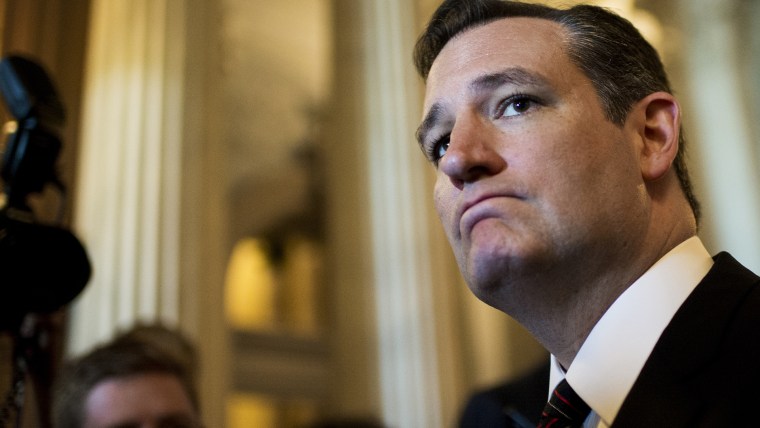Sen. Ted Cruz (R-Texas) isn't exactly shy about his opposition to the international nuclear agreement with Iran, but it's not exactly within his power to derail it. He's just one far-right senator with limited influence on Capitol Hill.
But over the weekend, it seemed as if the Republican presidential candidate was starting to turn his attention away from federal policymakers altogether. Indeed, as
Roll Call reported, Cruz is looking to states to help sabotage American foreign policy.
Sen. Ted Cruz said Sunday that doing everything possible to thwart the Iran deal should include states exploring imposing their own sanctions. The Republican presidential candidate from Texas was asked at a raucous town hall-style forum here about the prospects of states taking action to impose sanctions on the money the Obama administration has agreed to release as part of the deal regarding the country's nuclear development.
"I think that states should act and lead to do exactly that," Cruz said during a campaign appearance in Pelham, Alabama. (Note, Alabama is a Super Tuesday primary state, which votes just a week after the Nevada caucuses early next year.)
More so than usual, the far-right Texan seemed willing to hint that this fight wouldn't turn out well for his like-minded allies. "It'll be a fight," Cruz said. "It's not an open and shut legal argument, but we ought to do everything we can to resist this ... Iranian deal."
I'm inclined to put this in the "bad ideas" category.
For one thing, it's probably not legal. It's not up to states to create their own foreign policies; it's up to the
United States at the federal level. I'm reminded of
this Vox piece from January, when congressional Republicans began trying to sabotage American officials in earnest.
The Supreme Court has codified into law the idea that only the president is allowed to make foreign policy, and not Congress, because if there are two branches of government setting foreign policy then America effectively has two foreign policies. The idea is that the US government needs to be a single unified entity on the world stage in order to conduct effective foreign policy. Letting the president and Congress independently set their own foreign policies would lead to chaos.
And letting states and the United States have competing foreign policies would lead to even greater chaos. If the White House is principally responsible for American foreign policy, in conjunction with congressional oversight, there's definitely no role for state legislators.
What's more, I'm not exactly sure how Cruz envisions this plan working on a practical level. States aren't in a position to create an international coalition to impose new sanctions against Iran -- other countries partner with the United States government, not governors' offices and state legislators -- and states also don't have authority of federal banking laws or international finance.
My suspicion is Cruz already knows this, but didn't want to disappoint a far-right group in Alabama by telling them there's nothing Alabama can do to undermine U.S. foreign policy. That said, this isn't exactly responsible rhetoric from a prominent presidential candidate, either.
In the larger context, thought, let's not overlook the fact that if Cruz were confident that Congress would kill the diplomatic agreement, he probably wouldn't bother talking about states taking the "lead." Perhaps even he realizes the writing is on the wall?
